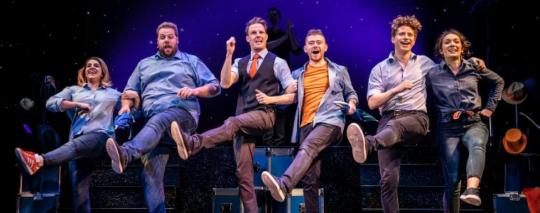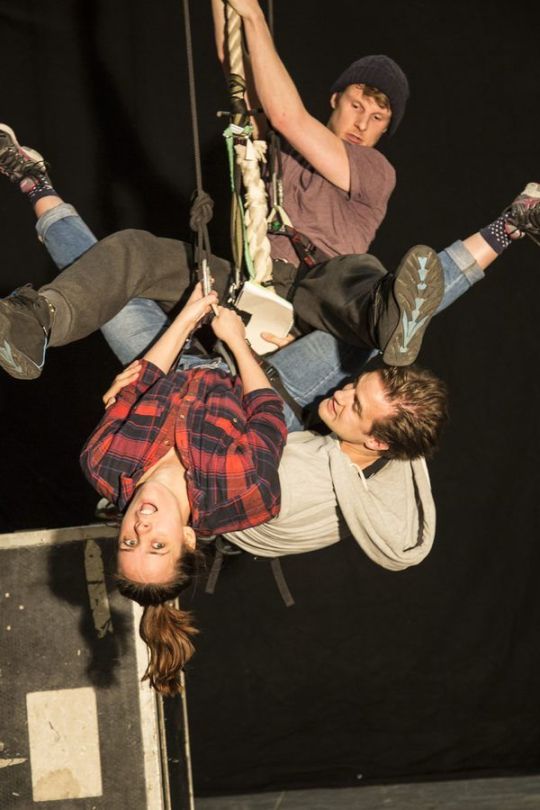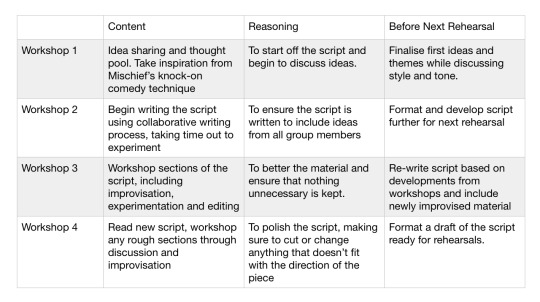Text
An Introduction to Mischief Theatre
Mischief are a theatre company based in London, formed from students of the London Academy of Music and Dramatic Arts. The team use theatre conventions such as comedic timing, scriptwriting and physical comedy to project an all-round image of silliness and enjoyment. They describe their theatre making style as “carefully choreographed chaos, merry mishaps and timeless comedy” (Mischief, 2021). This kind of theatre is engaging, as its light-hearted and joyous, but also meticulously planned and rehearsed. When asked in interviews, the cast of Mischief Theatre explain how once they have decided on an idea and plot, and begun the workings of a piece, they undertake countless rehearsals, perfecting their timing and performances. The kind of comedy the actors portray heavily relies on good timing and pace to be funny.

(Image from London Theatre https://www.londontheatre.co.uk/show/mischief-movie-night)
During their rehearsal process, Mischief Theatre like to experiment with improvisation, as they agree that some of the best comedy comest from improvisation and being in the moment. This has led to some of the cast’s favourite onstage jokes. With their recent success, Groan Ups (a character based comedy told as young children), Mischief spent three weeks in December 2018 workshopping the idea alone. After this, they began tweaking the script, altering lines and polishing dialogue before finally starting rehearsals in August 2019. This eight month break in rehearsal was essential for them to scrutinise the script and make any necessary changes before rehearsals began. (BGC, 2019) They have spoken about their writing process, and how it is very much a collaborative effort, ensuring everyone is content with the direction of the script. They also mentioned that they avoid being precious about their material, and have learnt to let things go when they do not land, or are not needed.
0 notes
Text
Why Choose Mischief Theatre?
I thoroughly enjoy comedies produced by Mischief Theatre, as they appear clever and witty, yet effortless to follow and easy to enjoy. Their style of comedy is extremely polished and refined, leaving no space for unnecessary jokes. I was fortunate enough to be able to see one of their productions, Magic Goes Wrong, live in London. Seeing how they played off each other on stage, and the cleverness of the writing and comedic timing really inspired me to look further into their style of theatre. They have had numerous successes from theatre to television, which provides an extensive pool of material to be able to research, watch and dissect.
I plan to investigate the workings of Mischief Theatre, looking at their writing techniques, rehearsal process, and performances in order to broaden my knowledge in the area of onstage comedy. This information will help me to better understand the professional world of comedic theatre, and better inform me when writing, rehearsing and performing. I am also interested in the way they write collaboratively, as it is something I have not had the chance to do very often. I hope to borrow from the way that they create, edit and rewrite the script as a group, and put this into practice myself.
While putting the methods I have researched into practice, I will keep in mind the process of Mischief Theatre, and incorporate that into my rehearsals.
0 notes
Text
Collaborative Writing Process
Mischief have stated before in interviews that their collaborative writing process is unconventional, however it works well for them, especially with comedy. From research, I understand that they allow one person to write part of the script, while two or more others throw ideas around. Switching this up often allows for the writing to feel fresh and avoids stale, repeated comedy. They are also vocal about how they incorporate jokes into their pieces. When someone comes up with a joke the group takes to, it is left in the script. If later, after development, they feel the joke no longer fits the scene, it is cut. They believe it is important that no one is precious about their material, in order to create the best piece of theatre possible.
I believe I can take this mentality and incorporate it into my theatre process, as I can often be precious about material and avoid cutting unnecessary sections. During the writing process of my piece, I hope to be able to have workshopped sessions with my group, in order to attempt this collaborative writing process. One of us will have access to the script while the others toss ideas around. We can then switch roles in order to get a different perspective on the script or material. The collaborative writing process will ensure we have the best possible material for our script, in a way where everyone feels they have contributed and agreed on the writing. From this, our piece will only develop further and become even more polished. One thing I admire about Mischief Theatre is their willingness to let go and be stupid when it is called for. I believe if I take this on board while writing and especially workshopping the piece, it will make for a comedic, funny, yet polished performance.
0 notes
Text
Workshopping and Improvisation Period
A six to nine-month workshopping period is not uncommon for Mischief Theatre. They often take extended periods of time to develop their material. After performing Magic Goes Wrong for a few performances in August 2019, the company took time away from the project to let it breathe. They workshopped the play in November/December 2019, before putting it back onstage in 2020 (Magic Goes Wrong, 2020). This development period is a process allowed for by the theatre company, as they believe that it is integral to the making of a successful performance. They spend the time rewriting sections of the script, workshopping jokes while tweaking and rehearsing sections of physical comedy. Henry Shields, one of the founders of Mischief theatre has paraphrased American novelist Ernest Hemingway stating “ninety per cent of writing comedy is rewriting it” (Shields, 2020). This appears to be a quote Mischief Theatre live by, as the extensive period of time they take is focused on re-working and re-writing their material.

(Image from Broadway World https://www.broadwayworld.com/westend/article/Photo-Flash-In-Rehearsal-for-Mischief-Theatres-THE-COMEDY-ABOUT-A-BANK-ROBBERY-20160321)
I can take this ethos of ‘writing is re-writing’ and incorporate that into my rehearsal process. Even though I may not have the same lengthy time frame, I can organise multiple rehearsals in a smaller time frame, workshopping the piece, in order to achieve the same effect. The more re-working achieved during the rehearsal process, the better the end product will appear. Each of the rehearsals can be focused on a small section of the collaboratively written script, allowing us to look meticulously at the pieces which make up the performance, and decide what is really necessary, and what isn’t working.
0 notes
Text
Murder at Haversham Manor: The Play that Goes Wrong
‘The Play That Goes Wrong’ is arguably the production that gained Mischief Theatre is acclaimed status as a theatre company. Performed by the fictitious Cornley Polytechnic Drama Society, the company was able to put on a play within a play. This allows us to see things not normally shown in a piece of theatre, mainly crew members, set-up, and backstage conversations. The play won numerous awards, and even performed at the Royal Variety Show. The play relies on a knock-on comedy effect, which is present in the script as well as on stage. For example, a door slams open to knock an actress unconscious. While carrying on the performance, she is expected to shout at the other actors, which makes way for an embarrassingly comedic moment where she is told to stop shouting, while laying lifeless on the floor. Furthermore, when it is time for the characters exit, she must be dragged offstage by crew members and other cast-mates through a window. This technique begins with a set-up event (the door hitting the actress) which has a comedic effect on the rest of the performance. It is clever in its device, and is a product of Mischief Theatre’s endless workshopping of their script and plot.
“The physical comedy rests on the set-up, speed — on the inherent ridiculousness of the whole situation” (Murray & Keefe, 2016) This excerpt from Physical Theatres: A Critical Introduction really embodies the ideology of Mischief Theatre in the sense that comedy in theatre is heavily reliant on the pace and tone of the performance to be successful. It also supports the ridiculous tone of Mischief’s works.
This clever comedic writing and timing is a device I would like to take inspiration from when workshopping my piece. While workshopping and re-working the script, I think it is possible to achieve a performance of this style. By sharing the responsibility of writing, it will allow for us to take time away to think of this knock-on effect of comedy, and implement it in the piece accordingly.
Here is a video of Mischief’s Royal Variety Performance via Youtube:
youtube
0 notes
Text
Plan Of Work
Using the knowledge I have gained regarding Mischief Theatre’s collaborative writing process, I will incorporate this into the process of writing for my piece. Looking at how they write collaboratively, it is very much a group effort in regards to writing and creating ideas. Everyone has a hand in the process. I will encourage this way of working when starting out with our piece. Consequently it will allow for a very open means of work, and will help the group reach a shared idea of what the piece should be. This will be actioned during the formative process of the piece, most notably idea sharing and during the writing of the first draft. I believe it will enable the ideas of the entire group to be incorporated into the piece in a constructive way.
Once the script has taken the form of a first draft, I would like to pull from the process of workshopping carried out by Mischief Theatre. Their extensive workshopping period will be less achievable in a shorter time frame, although this could be made up for in the frequency of rehearsals. Having multiple rehearsals in the same week will mirror the outcome of the intense workshopping period Mischief have. This will also allow for more improvisation and experimentation, and will again morph the script accordingly. The cycle of writing, workshopping and re-writing can be done multiple times to achieve a polished final script. This method of scriptwriting will help my group achieve a piece we can all be proud of, and all feel like we had a hand in, without the performance feeling messy and overcrowded. It will help sieve through the material that is unneeded, and streamline the devising process. While workshopping the script I will also remember the knock-on comedy effect Mischief Theatre make use of. Looking at extending the script and plot, the group and I can assess where would be best for comedic moments based on the past action in the scene, and how we can push it further using the techniques observed from Mischief. I will use this technique in order to further the development of the piece and achieve a more cohesive and funny end result.
0 notes
Text
Workshop Plan
Below is a brief plan for a two-week workshop schedule in order to produce a script, workshops 1 and 2 being held in the first week, with 3 and 4 in the second week. This plan would produce a script the group is proud of, while still taking time to experiment and improvise throughout the process. Re-writing and adapting ideas is prominent, and the techniques allow for change while still keeping on track for a final script. This mimics the formative process of Mischief Theatre, albeit on a much smaller time frame.

To summarise, while the script is in its formative stage, I will make use of a collaborative writing process similar to Mischief Theatre. While workshopping the script, I will allow for multiple workshops and rehearsals in the same week, to push the group further creatively. This will also allow for more improvisation in the workshops, which will inform us on where to take the script, and what to add in. While re-writing and improvising, it will be crucial to take a step back and look at the comedic timing in the piece, and take into account Mischief’s knock-on effect in terms of comedy. We can then make adjustments accordingly before moving onto our final rehearsals.
0 notes
Text
Bibliography
BGC (British Comedy Guide)
November 7, 2019
https://www.comedy.co.uk/pro/inside_track/mischief_theatre_interview/
Magic Goes Wrong (via Twitter)
https://www.twitter.com/magicgoeswrong/
Twitter
2020
Mischief Theatre
https://www.mischiefcomedy.com/
2021
Mischief Theatre at the Royal Variety Performance
https://www.youtube.com/watch?v=DOWO4gq-whg&t=373s
Youtube
2015
Mischief Theatre Interview on This Morning
https://www.youtube.com/watch?v=2QtxvNQAtps
Youtube
2020
Physical Theatres: A Critical Introduction
Murray, S. & Keefe, J.
Routledge Publishing
2016
Shields, H.
The Guardian
https://www.theguardian.com/tv-and-radio/2020/dec/21/we-try-to-be-devoid-of-cynicism-the-secret-to-the-goes-wrong-shows-success
December 21, 2020
Taft‐Kaufman, J.
Creative collaboration: The rehearsal process in chamber theatr
Taylor & Francis Publishing
1983 (Published online 2009)
0 notes